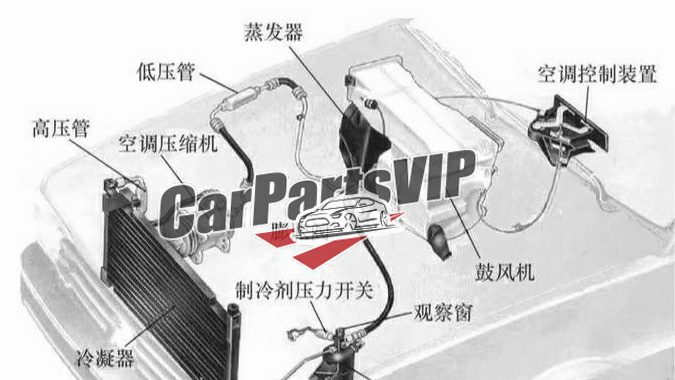The automobile air conditioning system is mainly composed of condenser, cooling fan, dryer, expansion valve, evaporator, blower, and compressor components.
How does a car’s air conditioning system work?
The working process of the automobile air conditioning system: The compressor is responsible for compressing the gas. It is driven by the engine crankshaft. When working, the gaseous refrigerant in the evaporator flows back into the compressor and becomes high-pressure steam after compression. The gaseous refrigerant flowing back from the evaporator will become high-temperature and high-pressure steam after compression. The refrigerant is always in gaseous state during this process. Next, the refrigerant flows to the condenser through the pipeline. The condenser is a heat converter. It is usually installed in front of the radiator water tank of the front of the car. The high-temperature and high-pressure gaseous refrigerant will condense into liquid after releasing heat through the condenser. The gaseous refrigerant enters through the pipe below the condenser and gradually flows upward. The gaseous refrigerant will absorb moisture through the dryer to improve the purity. At the same time, under the action of the cold wind coming in from the front of the car, the temperature drops rapidly and finally condenses into liquid and flows out from the pipe above the condenser. At this time, the refrigerant is in the form of high-pressure liquid. Then the high-pressure liquid refrigerant enters the expansion valve, which is a high-pressure valve. After the high-pressure liquid refrigerant is ejected through the expansion valve, it is converted into a low-pressure gas and pressed into the evaporator box. This is a pressure relief process. During the gasification conversion process, the high-pressure liquid will absorb the heat from the surrounding air, so the temperature of the air outside will become lower. At the same time, since the blower at the rear has been continuously pumping hot air into the car, a large amount of hot air will be absorbed when passing through the evaporator box, so there will be continuous cold air blowing into the car. At the same time, due to the absorption of heat from the air, the temperature of the refrigerant in the evaporator box will rise, and it will continue to flow to the compressor, and after being pressurized by the compressor, it will be pushed to the condenser again. This cycle repeats, and the temperature conversion work continues to cycle. The above is the working principle of the automotive air-conditioning system. Since the power of the compressor comes from the crankshaft of the engine, the fuel consumption of the automotive air-conditioning system will increase when it is working.


